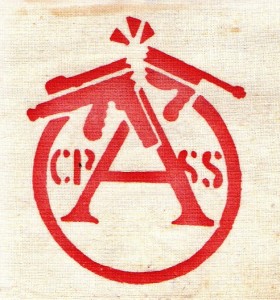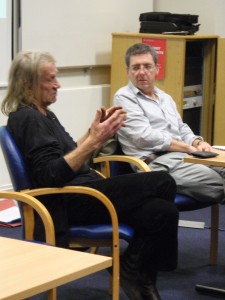No Sir, I Won’t: Reconsidering the Legacy of Crass and Anarcho-punk
Friday 28 June 2013
Organised by Oxford Brookes’ Popular Music Research Unit (PMRU)
in association with the Network of Punk Scholars (NPS)
 30 years since legendary anarcho-punk group Crass released their highly challenging LP Yes Sir, I Will, this symposium will explore the impact and long-lasting legacy of Crass and anarcho-punk. Crass are widely perceived as ‘reluctant leaders’ of the anarcho-punk scene; an ironic title for self-proclaimed anarchists, of course. The central question, for this study day, is: were Crass and anarcho-punk scene significantly effective politically or, alternatively, was the anarcho-punk scene surreptitiously more about clothes, music, image and ‘symbolic rebellion’ (to use Adorno’s term)?
30 years since legendary anarcho-punk group Crass released their highly challenging LP Yes Sir, I Will, this symposium will explore the impact and long-lasting legacy of Crass and anarcho-punk. Crass are widely perceived as ‘reluctant leaders’ of the anarcho-punk scene; an ironic title for self-proclaimed anarchists, of course. The central question, for this study day, is: were Crass and anarcho-punk scene significantly effective politically or, alternatively, was the anarcho-punk scene surreptitiously more about clothes, music, image and ‘symbolic rebellion’ (to use Adorno’s term)?
Newspaper articles, journalist/fan publications and a growing body of scholarly work on Crass and the anarcho-punk music scene has been keen to celebrate the fact that such groups sold many thousands of records (more than a million in total in Crass’s case, reportedly), contributed substantially to the rise of anarchistic strategies on the Left and the revitalization of CND in the UK, drew the attention of the UK establishment including the House of Commons and were eventually prosecuted under the Obscene Publications [A]ct.
Recent scholarly work on punk has challenged classic academic accounts of punk such as Dick Hebdige’s Subculture: The Meaning of Style. Querying the legitimacy of such accounts has been a specific intention of the nascent Network of Punk Scholars, for example. This symposium, however, would offer a counter-challenge to post-Hebdigean scholars: what is the meaning and politics of punk? What have bands such as Crass done, beyond the ‘bricolage’ which Hebdige describes? What are (were) the limits to their efficacy as agitators? Was/is anarcho-punk really about more than music? If so, was music the best possible vehicle for the forms of agitation which Crass undertook?
Within the study day, in addition to presentations from members of the Punk Network of Scholars and any other interested parties, an afternoon panel combines the views of Penny Rimbaud (the vociferous drummer of Crass), Sarah MacHenry (Crass fan, 1in12 member and ex-Witchknot/Curse of Eve drummer) and George McKay (author of Senseless Acts of Beauty, discussing examples of correspondences he had with Crass in the early 1980s).
Themes for papers might include (but are not limited to):
-

Penny Rimbaud and George McKay in conference discussion, Salford 2008 Specific discussions of Crass
- Discussions of other bands from the anarcho-punk milieu
- Comparisons between anarcho-punk and other punk sub-genres
- Anarcho-punk as a subculture
- Anarcho-punk as a political ‘culture of resistance’
- Continuities between hippies, punks, ‘eco-warriors’, ravers and so on
- Music versus Politics
- Anarchism versus Marxism
- Underground versus Mainstream
- Pacifism versus Violence.
The deadline for proposals for papers is Monday 15 April.
The symposium will be free of charge and will run all day. A free lunch will be provided. However, spaces are limited and interest is expected to be high so it is recommended that you book a place early to avoid disappointment. Those interested in giving a paper or wanting to book a place should contact Dr. Pete Dale at Oxford Brookes University, pdale@brookes.ac.uk c/o School of Arts, Richard Hamilton Building, Headington Hill, OX3 0BP. Please do not hesitate to contact Pete if you are at all interested in this symposium event.
